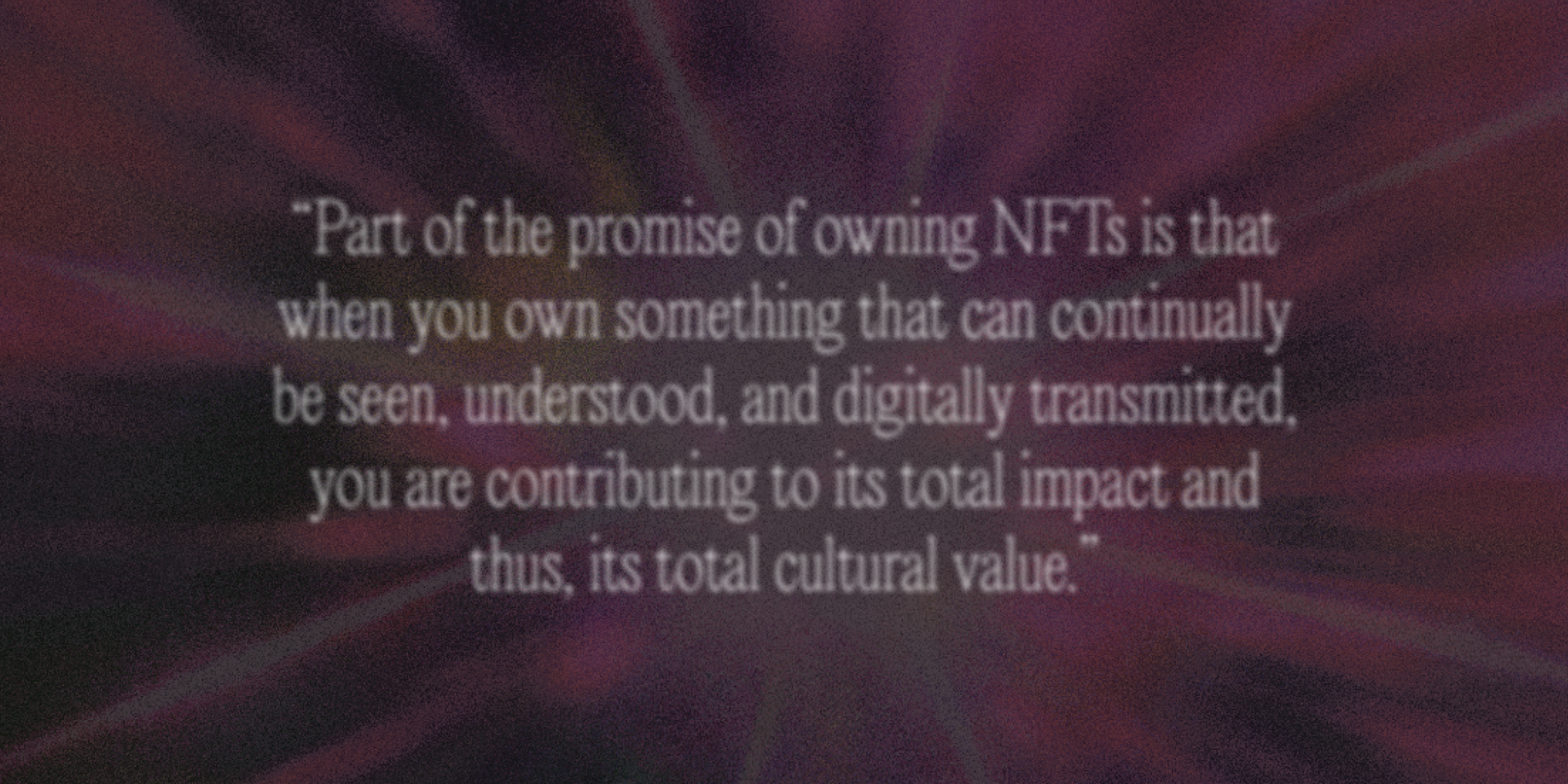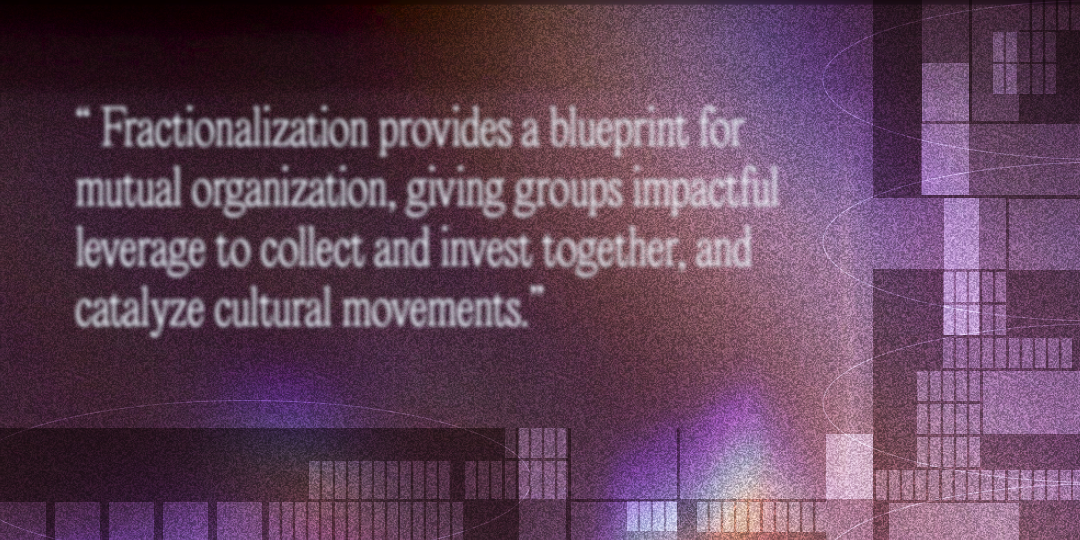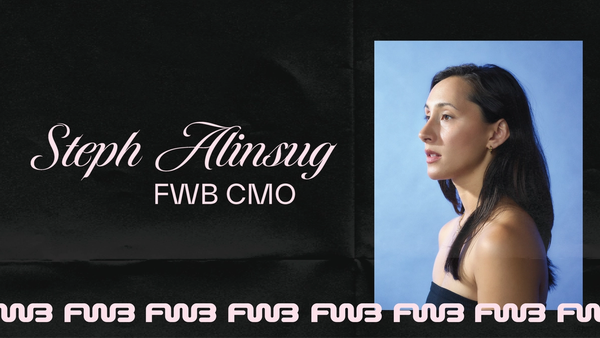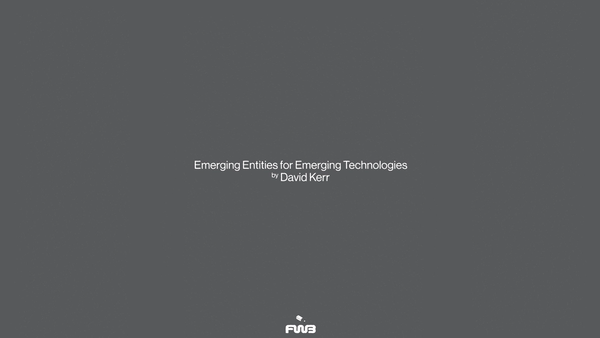- Ariel LeBeau
- Austin Robey
- David Blumenstein
- David Ehrlichman
- David Kerr
- Devon Moore
- Dexter Tortoriello
- Drew Coffman
- Drew Millard
- Eileen Isagon Skyers
- FWB Staff
- Greg Bresnitz
- Greta Rainbow
- Ian Rogers
- Jessica Klein
- Jose Mejia
- Kelani Nichole
- Kelsie Nabben
- Kevin Munger
- Khalila Douze
- Kinjal Shah
- Lindsay Howard
- Maelstrom
- Marc Moglen
- Marvin Lin
- Mary Carreon
- Matt Newberg
- Mike Pearl
- Moyosore Briggs
- Nicole Froio
- Ruby Justice Thelot
- Simon Hudson
- Steph Alinsug
- The Blockchain Socialist
- Willa Köerner
- Yana Sosnovskaya
- Yancey Strickler

Tue Sep 28 2021
The Scope of Shared Ownership
Historically speaking, society’s discussion of “property” has been negotiated through legacies of private ownership and investment motivated by profit: global supply chains, oil, patents for luxury doomsday bunkers—this is the very basis of capitalism. Whether tangible or intangible, property is deemed valuable by social bodies that delineate belongings and delegate borders. Even our shared “public” property is owned by governing entities and overseen by federal agencies. Lest we forget that participation in American democracy has historically been predicated on land ownership, and even human bodies themselves have been negotiated as property. The exclusionary principle of protecting ourselves from outsiders has historically offered citizens a sense of shared identity. In a distant past, however, nothing was more natural than for people to traverse lands, passing traditions and sharing knowledge and resources with one another.
Today, many of our memories, thoughts, and social and financial lives are shared across the internet. As the internet evolves, blockchain protocols, wallets, and private key cryptography are making it possible to own your assets without relying on third parties such as banking institutions, or IP lawyers. It’s increasingly obvious that our current legal systems, copyrights, and patents don’t adequately account for ownership when it comes to the expansive categories of the digital. With the rapid adoption of NFTs, for the first time, ownership doesn’t bar others from appreciating, experiencing, and sharing what you have.

Traditionally speaking, private ownership tends to box people out. We are witnessing a fundamental shift in the concept of ownership: once you own an NFT, you’ve subscribed to the notion that ownership is intrinsically relational; that value is determined in the context of other relationships, associations, and connections. One of the most exciting developments we’ve seen take shape recently is the ability to fractionalize ownership of 1/1 NFTs into infinitely divisible units. Part of the promise of owning NFTs is that when you own something that can continually be seen, understood, and digitally transmitted, you are contributing to its total impact and thus, its total cultural value.
Hodling Together
There are hard limits to individualism, the likes of which are only contoured by the resilience of group cohesion, and the tools that are transpiring to support collective action. Fractionalization demonstrates how people can reorient themselves in relation to one another, bridging conventions of hierarchy, proprietorship, and target markets. Decentralized Autonomous Organizations have pooled funds to gain access to high value NFTs that they can own as a collective. PleasrDAO, for example, has acquired a number of NFTs that they feel “belong to the people,” including Edward Snowden’s Stay Free, Pplpleasr’s x*y=k, and the Tor Project’s collaboration with Itzel Yard, Dreaming at Dusk. Among other collector DAOs that have surfaced in the last year are FlamingoDAO, which focuses specifically on NFTs, and herstoryDAO, whose mission is to collect and preserve the stories of marginalized crypto creators.
While multi-signature accounts have been the primary way for DAOs to collectively hold and distribute resources, other ownership models are also emerging. Gaining traction are protocols like Unicly and Fractional.art, built on the notion that anyone should be able to invest in shares of cultural assets and NFTs. Fractional.art makes it easy for community members to pool funds in order to buy a percentage of an NFT, and allows the NFT’s creator to see liquidity from their asset without selling the full work.
With the introduction of PartyBid, PartyDAO shipped a product that allows people to band together, pool capital, and participate in auctions collectively. Anyone can visit partybid.app to call an on-chain function to start a “party” that anyone can contribute ETH to, and receive a number of tokens proportional to the amount of their ETH used in the winning bid. PartyDAO has delivered an end-to-end product that simplifies collective bidding, making it feel seamless, easy, and fun.

Since its recent inception, PartyBid has proven to be a valuable resource for those looking to express solidarity and organize collective ownership. After the impressive collection of Zombie Punk#2066 by 478 people, #cryptocookout formed, kicking off PartyBids for the HOUSE OF HALLE and HOUSE OF TIARA, in a collective action to reclaim cultural artifacts that represent communities of color. As cultural capital builder, FWB member, and crypto cookout “chef” Ameer Carter shared, “Through PartyBID, Punks.House, and Fractional, we are enabling widespread adoption into crypto and generational wealth through artwork (NFTs) of cultural significance.”
PartyBids have taken off for a number of projects recently, including Jaime Martínez’s photograph of M.I.A, Yatreda’s Movement of the Ancestors series, and an experimental project called nouns. Nouns DAO hopes to shift the conversation around on-chain avatars, trustlessly auctioning 1 noun every 24 hours. Notably, FWB’s first NFT was purchased in the first-ever V1 PartyBid, which granted its winners bottle service at the FWB party in Paris, among other enticing rewards. The winning crew literally popped bottles, inaugurating PartyBid in the most appropriate fashion.
Infinite Division
“Ownership is the most intimate relationship that one can have to objects,” Walter Benjamin wrote. But what will that mean when fractional ownership realizes new applications in both the physical and virtual worlds? What does this portend for a soon-to-be fractionalized-everything future? The liquidity, price discovery, and democratization of the NFT market could just as easily be applied to online gaming, fantasy sports, mortgages, and more, opening new possibilities for investment strategies across multiple industries. On the FWB Discord, one member posed a cautionary question: “To share ownership will I have to fractionalize every aspect of my life? Do I really have to transfer my engagement ring to my fiance’s wallet? Do we really want everything ever logged on chain? That sounds like more data captured about me than ever, which is ripe for exploitation.” This sentiment echoes the fears of many who understand the ways social platform monopolies dictate how we represent ourselves, how our data is manipulated, and how our shared creativity and labor are used.
Web3 introduces unparalleled interoperability, and with it, the ability to imagine a more abundant future, equipped with new tools for thinking through ownership. Unbound by the restraints of specific platforms, Web3 promises that your data, and digital assets move with you as you navigate the burgeoning spatial realms of the Internet. These assets and identities, too, can be shared. Fractionalization provides a blueprint for mutual organization, giving groups impactful leverage to collect and invest together, and catalyze cultural movements. How else are we to bridge the gaps between people—whether they exist in solitude or proximity, whether they share cities or servers? Embracing such a paradigm shift insists that everyone can contribute, that different perspectives and price points are welcome, and that collective achievement can and should be rewarded.
Eileen Isagon Skyers is an artist, writer, and curator based in New York. Her ongoing work and research engages with identity, new media, and digital culture.
Graphics by Fiona Carty.


